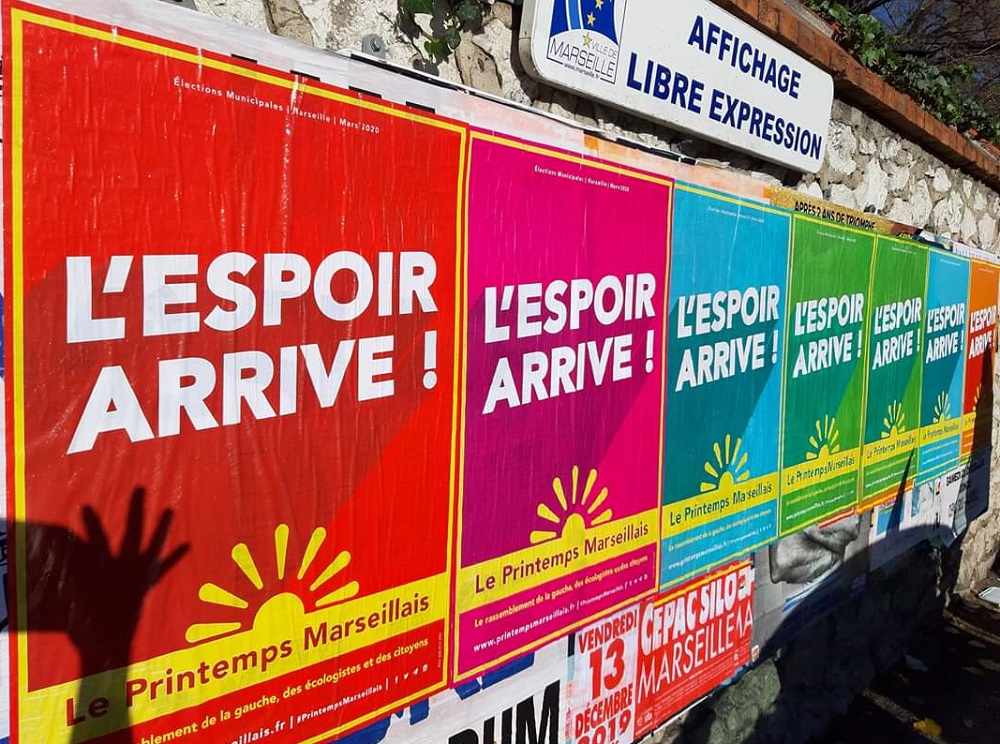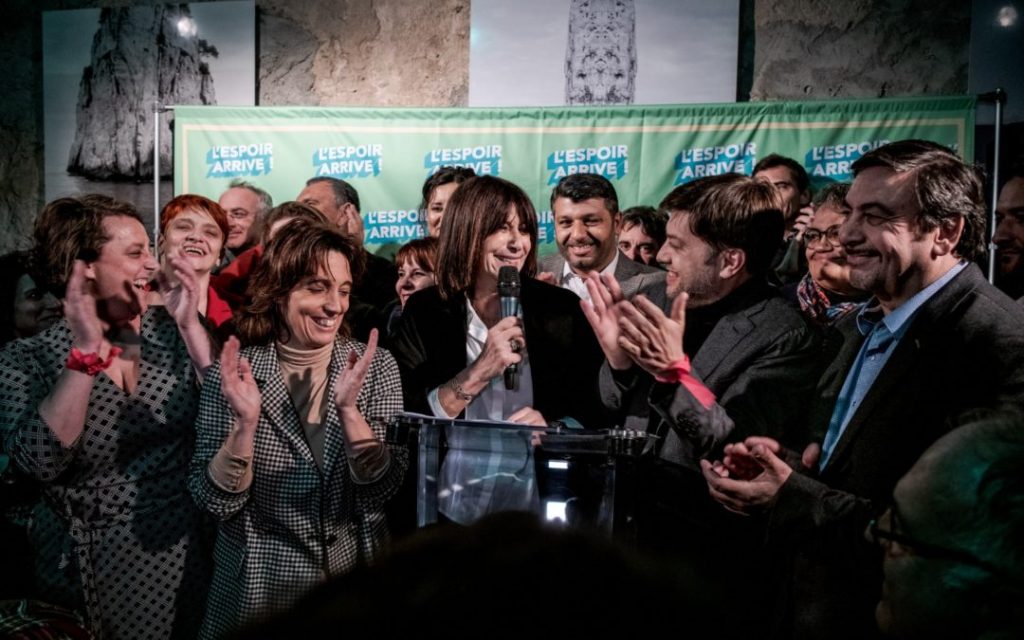Alima el Bajnouni is Vice-President of Commonspolis and an active member of several Marseille associations working for the right to the city, including “A City Center for All” and Babalex, which promotes Citizenship through the appropriation of Law.
In this interview, she shares with us her hopes and fears, and the challenges to be taken up by Printemps Marseillais, a plural confluence of citizens and left-wing parties elected in Marseille during the municipal elections in June 2020 in France.
What are your impressions following the victory of the ‘Marseille Spring’ (‘Printemps Marseillais’) electoral alliance in the Marseille local election?
For me, this is a historic moment. I have only known the right in local government and their pro-business and nepotistic policy, which has become characteristic of the dominant model in Marseille for 40 years.
The hope we had to see the ‘Marseille Spring’ win was precisely based on the need to change the political system. It was not simply to see the left taking power, because this was unfortunately not a sufficient guarantee of integrity. Only a proper governing policy can establish our faith. Behind the ‘Marseille Spring’ movement lies the hope that the coalition of social movements that emerged two years ago will be maintained and strengthened, and that the energy of local citizens will finally find a genuine platform for dialogue. This is our hope: to get rid of the bourgeois and conservative political culture of those who have become the governing elite.
But this was not a guaranteed victory. I experienced the three rounds of votes with great anxiety because there was a lot of manoeuvring, negotiations, resistance … a real thriller. In the end, it was an unexpected victory. For us, the fact that it was a left alliance which won, and one led by a woman, is historic. It is a wonderful first step!
According to you, what are the factors that made it possible to win the mayoral election in such a terribly adverse situation (covid-19, dispirited voters, some media outlets allied to the elite …)?
First, it should be said that if the left had not united there would have been no chance of winning. It must be noted that the EELV (Europe Ecology the Greens) preferred to go at it alone in the first round, which created a great disappointment. We did not understand…!
In the second round, Samia Ghali (formerly Parti Socialiste) also stood alone because there was no agreement with the Marseille Spring. Michelle Rubirola’s (the new mayor of Marseille) lead was weak in the first round. Many people did not go out to vote because of fears of the Coronavirus and we thought that many right-wing voters would rally in the second round…. The situation was difficult and unpredictable.
What happened was that there were citizen alerts and media reports on the hugely dysfunctional behaviour of the ruling municipal group… For example, soon after the period of confinement came to an end, there was the scandal of the fake proxies, which exposed the team of the LR (Les Republicains) candidate, Martine Vassal, who got people to fill out proxies in a completely illegal way, sending text messages to people offering to vote for them so that they would not have to leave their homes.
On the French TV channel France2, a report condemned this practice, which is so often associated with the nepotistic local government of the city of Marseille and has been institutionalised for decades. The scandal cooled many voters. There were also articles in the press about the Town Hall’s incompetence in resolving the crisis of inadequate housing. Local government workers also denounced the mayor’s poor handling of the problem. This again allowed us to warn the public…. In the end, there was only 35% of voter turnout.
A huge number of the people of Marseilles are simply disgusted by politics in the way it has been carried out so far. We will need to continue paying attention to this problem because the situation is complex. We must not forget that in this new political alliance there are also elected officials who have emerged from the very system that we are criticising. Moreover, we cannot forget that the alliance has happened because the new generation, carried by the popular movements organised following the collapse of 5th November 2018, has grown and demanded that a change should take place.

The last knockout punch consisted in convincing Samia Ghali to join the Printemps Marseillais alliance before the third round of votes. This was finally made possible, in part, thanks to the pressure from activists rooted on the left of her own movement. There was also a huge popular gathering in front of the town hall, and, apparently, you could hear the crowd from inside the chamber. When she came out, she said: “I am happy that I didn’t disappoint the people of Marseilles”.
Now, the victory is only relative: there was only 35% of voter turnout and in some, largely deprived, northern districts of the city there was up to 90% abstention. This proves that the working-class neighbourhoods do not feel represented at all today.
Among the elected officials too, there is a lack of representation from the northern districts and the most discriminated against populations. If we take the minorities, yes, there are elected officials who represent them, but, overall, they do not come from working-class neighbourhoods. And this is a real problem. We have to find the time, the methods to build relations, to do real rank and file work to connect with those sectors, to rebuild trust, because we do not know how to do it.
The question of representation is complex…. And within the Printemps Marseillais the problem has not been resolved. This issue was very strongly felt when it was time to choose the candidate during the 1st round in the 13th and 14th boroughs. Mohamed Bensaada (La France Insoumise), known as a very committed man in Marseille in general and in this area in particular was side-lined in favour of Jérémy Bacchi (Parti Communiste Français), who certainly grew up in this district but by whom the residents felt less represented. Why not create an opening? The next six years will be a real challenge to change such practices.
What are the challenges for the new municipal team?
They are numerous, schools, housing … but also to develop mechanisms and procedures that will install a permanent democracy: citizens who are collectively able to contribute to, watch, criticise and readjust municipal policies (like a cursor).
Faced with the announcement, how will it be converted into actions?
We remain vigilant. Personally, I did not get involved in the Printemps Marseillais, but I can say that many of the top of the list candidates, not all fortunately, come from party politics. It is going to take time and a lot of determination to dismantle traditional approaches. There are certainly exceptions: Marie Batoux, who although was a card-carrying member of France Insoumise was nevertheless involved in civil society, and was very active in general meetings as well as in the 5th November Collective, given that she herself had been evicted. Olivia Fortin, candidate in the 6th and 8th boroughs, also comes from a civil society background, and she managed to defeat the sitting candidate inside the traditional bastion of the right. Emilia Sinsoilliez invested and elected in the 3rd borough … It is necessary that elected officials who are also actively involved alongside the population, influence traditional political practices, and not the other way around … They should not lose their soul!
But it must be said and repeated, the place and the representation of civil society inside Printemps Marseillais is very much insufficient.

Another challenge, and this is not the least of it, is the Metropolis (Trans. Note: Administrative body) that oversees several local governments, because it has been dominated by the same conservative and nepotistic right that we have known until now. When you know the remit of the Metropolis, this is not reassuring! The town hall is an island in the middle of a rather hostile ocean.
A promising element: the Marseille popular general meetings have resumed, and the activists are really motivated and vigilant. We tell ourselves that there are now potential allies at the town hall. We must double our efforts, vigilance, and pressure. Above all, we can certainly not lose control!
What bridges should be built between the town hall and the citizens’ movements?
We would like to set up popular assemblies. Just like what was done in Grenoble: popular neighbourhood meetings, sometimes coupled with Popular Town Planning Workshops. Local assemblies which can raise rank and file needs with the town hall and make concrete proposals for their neighbourhoods. All the assemblies could come together in a larger city-wide assembly (an assembly of assemblies). Perhaps each neighbourhood assembly could draw lots of people who would be charged with representing them in the city-wide assembly. And they would rotate.
And since the new town hall has announced the establishment of participatory budgets, each neighbourhood assembly would have access to a participatory budget with which to initiate projects at the neighbourhood level. An assembly that would not be subject to the institutional constraints of the citizens’ councils for example (or of the neighbourhood interest committees).
What about women in all of this?
Michelle Rubirola, the new mayor, is in a listening and networking spirit. She is a woman I respect because she is sincere in her actions and words. That said, I wish her all the courage and persistence, because it is not going to be easy in this context!
Another woman, Olivia Fortin, who created Mad Mars, played an important role in the unifying dynamic and in the Printemps Marseillais victory, since she won over a key sector. But I don’t know her.
Finally, it’s nice to see all these women rise to prominence in several cities in France. Provided they do not fall into the masculine side of the force!
How is this victory a boost for the municipalist movement?
It is the fact of having put forward what is possible: to lead to victory a project which speaks of the common good and of dialogue with civil society. The locks are broken!
Starting from a financial audit and the recommendations of the Court of Auditors seems to me to be a good place to begin to know where we are, discover the room for manoeuvre, be aware of obstacles and finally to support the emergence of this popular movement. There has been a gigantic job done by citizens (especially those from the General Assemblies) to dissect the municipal budget (in the same way there has been huge popular focus on schools). This work has empowered the new municipal team. I think that the environment is promising today for municipalism to take shape in France and in particular in Marseille.
This article was first published in French and Spanish by Commonspolis.
Featured Image: Sun rising over Marseille (Photo: Le Printemps Marseillais)

